Tesla Model S: Harness - Body Front Left (Remove and Replace)
Note: This procedure explains how to remove the front left body harness from a vehicle with the 2nd Generation High Voltage configuration. Vehicles with the 1st Generation High Voltage configuration might be different.
Note: These graphics show a LHD vehicle produced in mid-2014. Earlier and later production vehicles might have slight differences in the location of mounting clips and the exact design of the harness.
Note: In this procedure, it is necessary to access both the underhood storage area and remove the front LH wheel.
Removal
- Raise and support the vehicle so that there is access to the underhood area and to the front LH wheelwell.
- Perform the vehicle electrical isolation procedure (refer to procedure).
- Remove the front LH wheel.
- Remove the front left wheel arch liner(refer to procedure).
- Remove the underhood storage unit (refer to procedure).
- Remove the wiper arms (refer to procedure).
- Record the positions of the small-gauge cables on the 12V fusebox.
- Release the nuts (x6) that secure the top layer of harnesses to
the 12V fusebox (torque 5 Nm). Release the harnesses from the fuse
box.
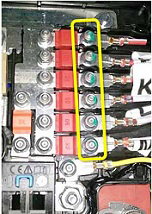
- Remove the wire separator to expose the bottom layer of harnesses.
- Release the nuts (x5) that secure the lower layer of harnesses
to the 12V fusebox (torque 5 Nm). Release the harnesses from the
fuse box.
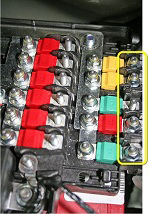
- If the vehicle is equipped with air suspension, release the
bolts (x2) that secure the air reservoir (torque 2.5 Nm). Carefully
set the reservoir in the RH side of the frunk.
Note: It is not necessary to disconnect the air
lines.
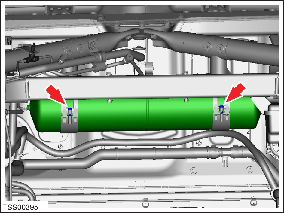
- Release the 2 bolts that secure fusebox 2 to the crosscar beam (torque 6 Nm).
- Slide the harness connector off of the base of the coolant
heater assembly.
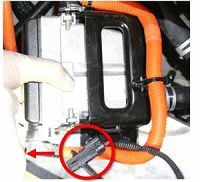
- Release the bolts (x2) that secure the coolant heater assembly
to the crossmember (torque 8 Nm). Carefully set the coolant heater
assembly aside.
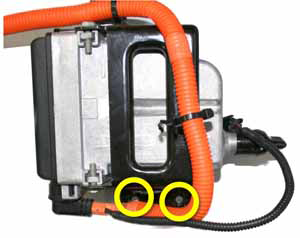
- On the firewall above the forward junction box, disconnect the 3
power transfer connectors.
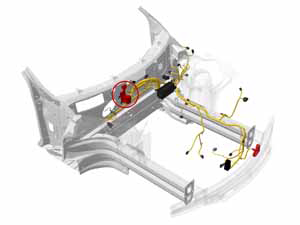
- Release the RH side of the harness from the supports on the
firewall.
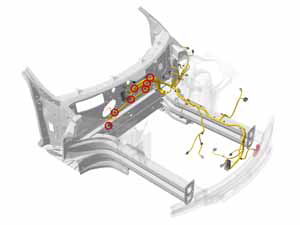
- Disconnect the remaining connectors on the firewall.
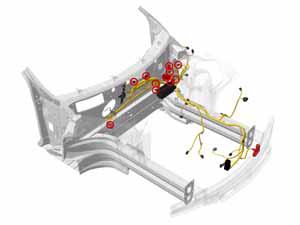
- Remove the front LH wheel.
- Remove the front left wheel arch liner(refer to procedure).
- Working from the front LH wheelwell, disconnect the connectors
shown.
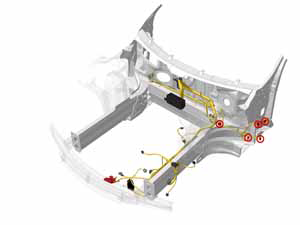
- Release the harness from the supports on the RH side of the
firewall.
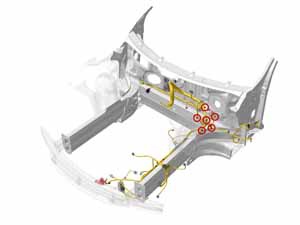
- Release the harness from the supports inside the wheelwell.
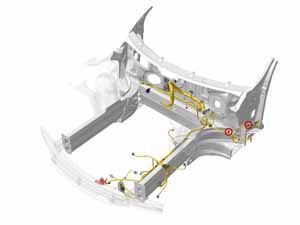
- Pull the rear section of the harness out through the front LH wheelwell.
- Pull the rear section of the harness into the underhood area.
- Release the screws (x2) that secure the 12V positive jump post
to the bumper (torque 3 Nm).
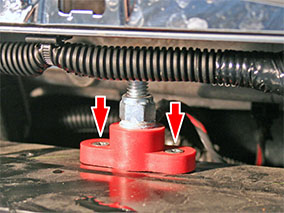
- Release the nut that secures the ground connections on the LH
side rail (torque 9 Nm). Remove the ground connections from the
stud.
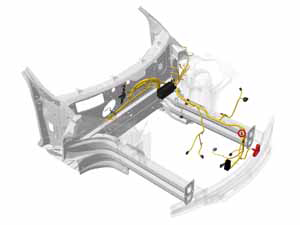
- Disconnect all the connectors on the LH side rail.
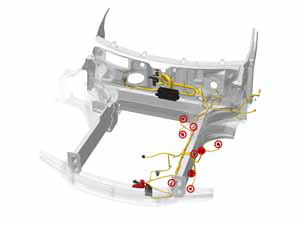
- Release the harness from the supports on the LH side rail.
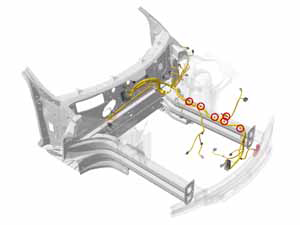
- Disconnect the connectors on the front of the harness.
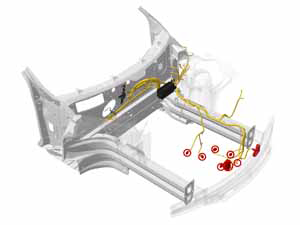
- Release the harness from the supports at the front of the
vehicle.
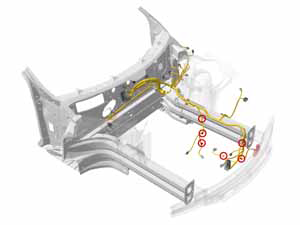
- Pull the harness out from the front of the vehicle.
Installation procedure is the reverse of removal.

